#sulla: the last republican
Text

so. my laptop is Deceased, which means I don’t have half of my pdf library (because I wasn’t able to back it all up yet. weeping and wailing), and THAT means that I have a much smaller pool of texts to work off with and cite, so. this is a much more direct glimpse into my thoughts when I’m reading ancient sources and don’t have the poetry of scholars to direct my imagination
anyway, the tris homines alliance is also an informal club for people that had weird but formative relationships with sulla. like. a real Make Them Worse situation happened there. crassus becomes someone who is half shadowy rumor behind every dealing in the eyes of others, pompey and caesar drag rome back into civil war, sulla says that caesar resembles marius but it’s sulla’s playbook that caesar later runs. everyone dies in places where they do not expect to die.
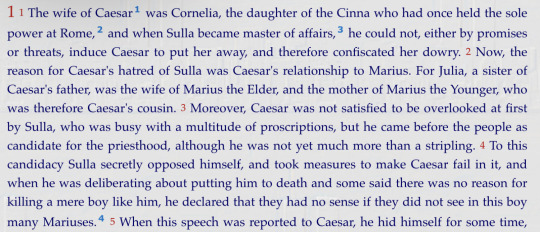
Plutarch, Caesar


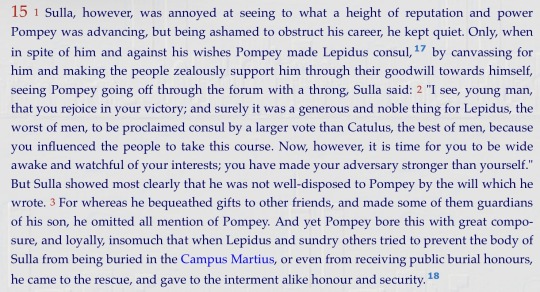
Plutarch, Pompey

Plutarch, Crassus
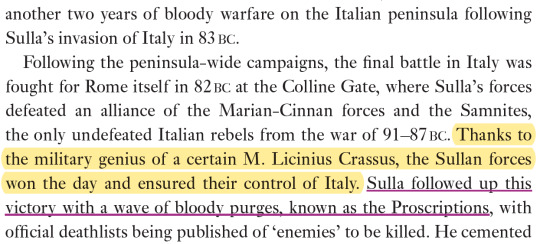
Rome, Blood & Power, Gareth C Sampson

Sulla: The Last Republican, Arthur Keaveney
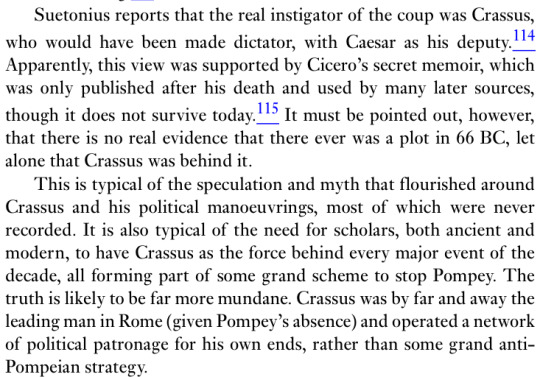
The Defeat of Rome: Crassus, Carrhae and the Invasion of the East, Gareth C. Sampson
#I’m doing all of this on my iPad and I’m fucking dying#I’m like. I’m OLD I only use my iPad for art and work. Typing all of this out on a touch screen took out my lifespan#tris homines#roman republic tag#everyone clap for caesar#komiks tag#Can’t wait to do the comic where caesar has Crassus’ fingers in his mouth bc that has no citations. maybe one.#gotta. Pick myself up off the ground. I have spent enough time crying over lost PDFs. I will probably cry more.#but these three absolute nightmares are calling my name and I will heed the call. I can ALSO make them worse#shaking hands with sulla on that and on that ONLY#drawing tag#gnaeus pompeius magnus#marcus licinius crassus#gaius julius caesar
538 notes
·
View notes
Text
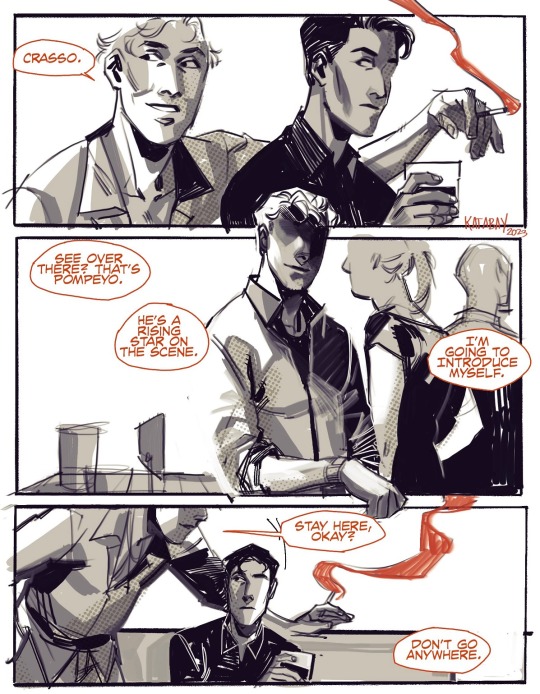

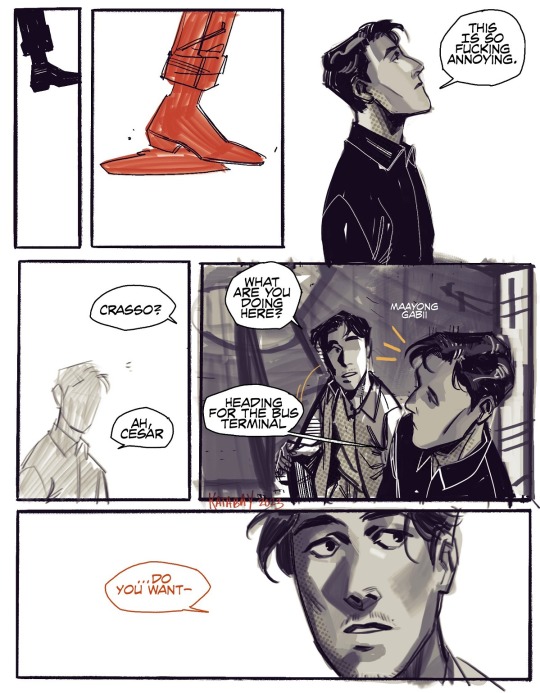
testing out some brushes I think I want to use for when I actually start posting bad governance in narrative order, which took a slight detour because I had to do some math with character ages and events and oh I hate doing math so much
so! do you ever realize you're definitely going to get dumped but you're stuck waiting it out because you're not really in a position to do anything about it except sit there and deal with it
ofc you can always just. ditch the party.
this is playing off of the historical dynamic between sulla, pompey, and crassus because sulla sure loved playing favorites, and it was never crassus. however a man doesn't need to be a favorite to make use of him, etc etc and favoritism doesn't last forever, but I'll get into that later
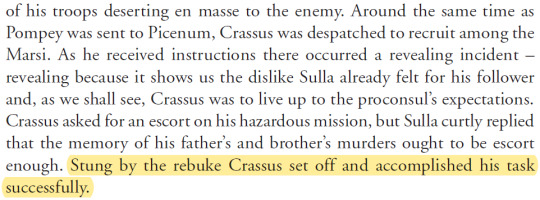


Sulla: The Last Republican, Arthur Keaveney


Rome, Blood & Power, Gareth C Sampson

Plutarch, Pompey
#bad governance the series#republikang romano remixed#komiks tag#i am so. sleepy. right now#anyway i was blocking out the years and i realized that i needed to actually pay attention to who was what age#especially with cesar#but also with crasso's career trajectory#since he was originally planning on becoming a lawyer but SOMEONE ruined that for him so he became a teacher instead#and then decided pivot over to businessman for a bit (in sugar ofc) before going back to politics#THEE ideal crassus-pompey song is hatef--k by the bravery btw
157 notes
·
View notes
Note
Err Augustus VOR
Probably very high - in all the ways Caesar was a failure, Augustus was a success. When thinking about VOR a lot of what you do is look at how the consensus system operates, and what its default state is. Rome in Augustus's era, in a sense, had no default state. The ability of the Roman "republican" system to govern its radically expanded empire was minimal - it constantly lurched from (internal) crisis to crisis. Many rode that wave to powerful positions - Sulla, Pompey, Caesar, and others. So people were trying to resolve this problem; they just all failed at it, generally due to their hesitancy to truly build something new.
Augustus had the vision they all lacked. He directly annexed huge swathes of puppet-state territory, repurposed the Senate into an administrative-patronage network, built the position of emperor into a position of fiscal and military dominance, and so on. He was good at battle, good at politics, good at administration, and at least something of an idea man, he had it all. Its in particular how lengthy the crisis was that sells me on Augustus - others had the chance to do what he did by the dozens, and they didn't. And the system he set up was robust - outside of one big crisis that lasted only a year in 69 AD, Rome would not have a large civil war until nearly 200 years later, when previously it was plagued by them. His system definitely lasted, and it brought in new prosperity on top - so much so that its collapse in Crisis of the Third Century is permanently visible in the archaeological record.
Though it is a good time to note that older figures get privileged in the analysis. Due to the lack of sources on the era, its very common for credit to accumulate at the top. Did Augustus envision the civil service he created? Or did someone else that Livy never bothered to mention? People in the past legitimately did have more agency, but it is also way easier to observe societal ideation today. So I will dock tiny points here on the uncertainty scale.
Still, he is the Ur-Emperor for a reason: S
40 notes
·
View notes
Note
how do i get into those roman guys? i watched a bit of rome hbo back in the day. what are good sources to read? or cool books? i love what you post about them even though im always a bit lost
hiii!!! first of all, thank you so much! I'm so excited to get to recommend stuff because I love talking about what I've been reading and watching. Honestly though? My suggestion is that if you're already seeing stuff about the Rome guys and you've watched HBO Rome you have a baseline of knowledge and more or less know some guys so pick your favourite and start there! Reading about your favourite guy will lead you to like 5 different insane guys and you can then continue reading from there :)
I only watched HBO Rome this year I think? But I already knew about some of the guys because my friend Gus is a big Rome fan and I knew I liked Augustus so I read
The Power of Images in the Age of Augustus by Paul Zanker
Then I moved on to Agrippa and read
Marcus Agrippa: Right-Hand Man of Caesar Augustus by Lindsay Powell
which led me to rereading the Shakespeares, a couple of research papers on Crassus, some essays Gus sent me, Camus' Caligula, Catullus' stuff and
Sulla: The Last Republican by Arthur Keaveney
I'm currently reading a Lucullus bio! Other than this I watched a couple of stagings of the Shakesperes and this Cleopatra musical which was sooo fun and whichever Rome movie looked fun like the 1963 Cleopatra and 2003's Imperium: Augustus. I also listened to the History of Rome podcast when washing my dishes.
Currently, I'd recommend subscribing to e-pistulae which I've found is the easiest way of reading Cicero's letters, if you're interested in the Pharsalia, the Pharsalia book club is about to begin soon which I'm very excited about and here's a great list of recommendations if you want to pick up a biography of your favourite guy! Happy reading :))
#150#anonymous#thank you so much for the ask all movie links go to letterboxd and all book links go to storygraph!#this was so fun if you need more book recommendations about your favourite guy anon text me its fine I love to talk about rome .#my method for finding books though is if my mutuals post about a guy/biography in an interesting way I'll pick it up!#have fun!!#asks#001
12 notes
·
View notes
Note
Can you recommend any non-fiction books about roman history for someone looking to get a little bit deeper into it?
yeah! do also check my book rec tag because ive probably answered something similar to this at Some point. also bear in mind this is specific to the roman republic (and tbh mostly the late republic) because i just do not care. like rome kept happening but who Give a shit. look at it. it's got emperors. anyway
a companion to the roman republic ed. nathan rosenstein and robert morstein-marx and the cambridge companion to the roman republic ed. harriet i. flower are both absolutely massive and full of v good introductions to a variety of topics! get basic understanding of a thing! nice!
some specific Books I Like on individual topics: the rise of rome: from the iron age to the punic wars by kathryn lomas covers the earliest roman Anything up to the third century And grounds that history in the context of what was going on in the rest of italy at the time. roman republics by harriet i. flower is about different ways of periodising the history of the republic(s?) and in doing so gives a good overview of major changes to the political system. party politics in the age of caesar by lily ross taylor is Quite Old but imo still holds up as an introduction at least.
you could also consider Picking A Guy and reading a biography. love it when a life is put into the context of wider history while also existing as a more coherent narrative on which to pin that history. some that are fun are sulla: the last republican by arthur keaveney, the patrician tribune by w. jeffrey tatum about clodius pulcher (the introduction is also suchhhhhh a good summary of 'party' politics and why that's not a great way to think about it!), clodia metelli: the tribune's sister by marilyn b. skinner about clodius' sister who was maybe also lesbia from catullus' poetry, cato the younger: life and death at the end of the republic by fred k. drogula, fulvia: playing for power at the end of the roman republic by celia e. schultz (i have been meaning to read this one lol), and brutus: the noble conspirator by kathryn tempest.
my anti-recommendation is rubicon by tom holland No i have not read it Yes i think it sucks. L + i have been shown excerpts of the bad prose + the republic had fallen apart way before caesar crossed the rubicon + the author has a whole bunch of bad takes + read attis (1996) instead
#clutuals as always i welcome your book recs <- guy who got into roman history via historical fiction#book list#beeps
68 notes
·
View notes
Text
im like three pages into sulla the last republican and. mr keaveney you want to kiss that dictator dont you
3 notes
·
View notes
Text


Plutarch's Crassus (trans. Seager) / Sulla: The Last Republican, Arthur Keaveney
4 notes
·
View notes
Text
youtube
Julius Caesar: From Political Pawn to Power Player
Julius Caesar is one of the most iconic figures in history. His name is synonymous with power, ambition, and the fall of the Roman Republic. But how did this young man, nearly executed during Sulla’s Prescription, rise to become one of Rome’s most powerful leaders? Let’s explore the journey of Julius Caesar, from his early life to his rise as consul, and the political maneuvers that led to his domination of Roman politics.
The Early Life of Caesar
Julius Caesar was born into a patrician family, but his early life was far from easy. At the age of 18, Caesar found himself on Sulla's Prescription list, marked for death due to his familial connections. It was only through the influence of his mother, Aurelia, that he was spared. This experience left a deep impression on Caesar, teaching him the importance of alliances and the brutal realities of Roman politics.
Caesar’s Consulship and Reforms
Fast forward to 59 BC, and Caesar had climbed the political ladder to become consul of Rome. The consulship was the highest elected office in the Roman Republic, and Caesar used it to push through a series of populist reforms. 🏛️
His reforms included redistributing land to soldiers and reducing taxes—moves that endeared him to the lower classes but angered the aristocracy. Caesar’s co-consul, Marcus Bibulus, was supposed to balance Caesar’s power, but he was quickly sidelined by the more charismatic and forceful Caesar. In fact, Bibulus was so powerless that the year of their joint consulship became known as the "Consulship of Julius and Caesar," a clear indication of who was really in charge.
The First Triumvirate: A Masterstroke
To secure his position, Caesar formed the First Triumvirate with Marcus Crassus, Rome’s wealthiest man, and Pompey the Great, the Republic’s most celebrated general. This alliance allowed the three men to control Rome’s political landscape, bypassing the traditional republican structures that had governed Rome for centuries.
Caesar had the muscle, Crassus had the money, and Pompey had the army. Together, they were an unstoppable force. But like all political alliances, the Triumvirate was fragile. Each man had his own ambitions, and these eventually led to conflicts that would tear the Republic apart.
Caesar’s Legacy
Caesar’s rise to power marked the beginning of the end for the Roman Republic. His ambition, charisma, and strategic genius allowed him to dominate Roman politics, but it also set the stage for civil war and the eventual rise of the Roman Empire. While some view Caesar as a tyrant who destroyed the Republic, others see him as a visionary who reshaped Rome for the better.
One thing is certain: Caesar’s impact on history is undeniable. His life and legacy continue to be studied and debated, reminding us of the complex interplay between power, politics, and the human spirit. 🌟
Conclusion
Julius Caesar’s journey from a young man on Sulla’s hit list to the most powerful leader in Rome is a story of resilience, ambition, and the relentless pursuit of power. His actions not only changed the course of Roman history but also left a lasting legacy that continues to influence the way we think about leadership and governance today. As we reflect on Caesar’s life, we are reminded of the importance of vision, determination, and the sometimes dangerous allure of power. 🔥
1 note
·
View note
Text
Americans,not having enough after sacrificing the whole Ukraine in a meat grinder, now wish to throw taiwan in the same position, the gospel goes the same, from "to the last Ukrainian" to "to the last Taiwanese"
The post is machine translated
Translation is at the bottom
The collective is on telegram
⚠️ FARNETICAZIONI GUERRAFONDAIE DEL PARTITO REPUBBLICANO: FORNIRE ARMI AD OGNI FAMIGLIA A TAIWAN, COSTRINGERLI AD ANDARE CONTRO LA CINA" ⚠️
🇺🇸 Ogni giorno, un imperialista statunitense si sveglia, e sa che dovrà essere più "falco della guerra" dei suoi colleghi per avere quei cinque minuti di celebrità dovuti a qualche sprezzante dichiarazione anti-Cinese, anti-Comunista e guerrafondaia 🦅
🤡 Oggi, è il turno di Vivek Ramaswamy, del Partito Repubblicano, che si descrive, sul suo Profilo Twitter come "Cittadino e Capitalista", che ha affermato di «aver trovato un modo per fermare l'avanzata Cinese su Taiwan», ovvero: dare più armi al regime-fantoccio di Tsai Ing-wen
🤦♂️ Ecco le dichiarazioni:
😱 "Vuoi che la Cina non invada Taiwan? Ecco cosa possiamo fare: la National Rifle Association degli USA può aprire una filiale a Taiwan, e dare armi ad ogni famiglia di Taiwan (❗️), costringerli a difendersi (❗️), vediamo cosa farà allora Xi Jinping" 🤹♂️
💀 Tralasciamo la ridicola parte finale, perché non merita alcun commento, ma ciò che viene prima è assolutamente disgustoso 🤮
🤝 Le persone, sull'Isola di Taiwan, non vogliono la Guerra con la Cina, e lo hanno dimostrato a più riprese, con la vittoria del KMT alle Elezioni Locali, e la storica visita di Ma Ying-jeou, ex Presidente del KMT e Leader di Taiwan, nella Repubblica Popolare, che ha ricordato l'importanza dell'appartenere al Popolo Cinese 💕
😡 Dichiarare di voler fornire armi ad ogni famiglia dell'Isola, e costringerli a "difendersi" rappresenta l'ennesimo tentativo da parte degli imperialisti statunitensi di fomentare l'ennesima "guerra per procura", costituita sul pericoloso mantra del «fino all'ultimo cittadino di Taiwan», dopo il «fino all'ultimo Afghano» e «fino all'ultimo Ucraino» ❗️
🇺🇸 Sull'ennesima dichiarazione USA riguardante "L'Invasione Cinese a Taiwan", rifarsi a:
🔺Domani piove, e non piove! Allora piove dopodomani, e non piove! E così via... | Tutte le previsioni farlocche degli USA sull'invasione "imminente" della Cina a Taiwan 🤡
🔍 Per comprendere al meglio la Questione di Taiwan, rifarsi a:
🔺Master-Post sulla Questione di Taiwan 📖 | Questioni Storiche, Riunificazione Pacifica, Questione Militare, Interferenze Statunitensi, Separatismo del DPP 📚
🇨🇳 丢掉幻想,准备斗争 🇨🇳
🌸 Iscriviti 👉 @collettivoshaoshan
⚠️ REPUBLICAN PARTY WARHAWK RANTS: PROVIDE EVERY FAMILY IN TAIWAN WITH WEAPONS, FORCE THEM TO GO AGAINST CHINA" ⚠️
🇺🇸 Every day, a US imperialist wakes up, and knows that he will have to be more "war hawk" than his colleagues to have those five minutes of fame due to some contemptuous anti-Chinese, anti-Communist and warmongering statements 🦅
🤡 Today, it's the turn of Vivek Ramaswamy, of the Republican Party, who describes himself on his Twitter profile as a "Citizen and Capitalist", who stated that he «found a way to stop the Chinese advance on Taiwan», namely: give more weapons to Tsai Ing-wen's puppet regime
🤦 Here are the statements:
😱 "Do you want China not to invade Taiwan? Here's what we can do: The National Rifle Association of the USA can open a branch in Taiwan, and give weapons to every family in Taiwan (❗️), force them to defend themselves (❗️), let's see what it will do then Xi Jinping" 🤹♂️
💀Let's skip the ridiculous last part, because it deserves no comment, but what comes before is absolutely disgusting 🤮
🤝 People on the island of Taiwan do not want war with China, and they have proved it many times, with the victory of the KMT in the Local Elections, and the historic visit of Ma Ying-jeou, former Chairman of the KMT and Leader of Taiwan, in the People's Republic, who recalled the importance of belonging to the Chinese people 💕
😡 Declaring that they want to supply every family on the island with weapons, and forcing them to "defend themselves" represents yet another attempt by the US imperialists to foment yet another "proxy war", based on the dangerous mantra of «until the last citizen of Taiwan», after «to the last Afghan» and «to the last Ukrainian» ❗️
🇺🇸 On yet another US statement regarding "Chinese Invasion of Taiwan", refer to:
🔺 Tomorrow it's raining, and it's not raining! Then it's raining the day after tomorrow, and it's not raining! And so on... | All US fake predictions about China's ′′ imminent ′′ invasion of Taiwan 🤡
🔍 To better understand the Taiwan question, refer to:
🔺Master-Post on the Taiwan Issue 📖 | Historical Issues, Peaceful Reunification, Military Issue, US Interference, DPP Separatism 📚
🇨🇳 丢掉幻想,准备斗争 🇨🇳
🌸 Subscribe 👉 @collettivoshaoshan
#socialism#china#italian#translated#china news#communism#collettivoshaoshan#xi jinping#marxism leninism#marxist leninist#marxismo#marxist#marxism#multipolar world#multipolarity#taiwan government#taiwan strait#taiwan war#taiwan#taiwan news#national rifle association#republican party#republicans#Vivek Ramaswamy#kuomintang#ma ying jeou#asia news#american news#american imperialism#chinese communist party
1 note
·
View note
Text
Greece: A historical essay - Part 2/4
ROMAN AND BYZANTINE GREECE:
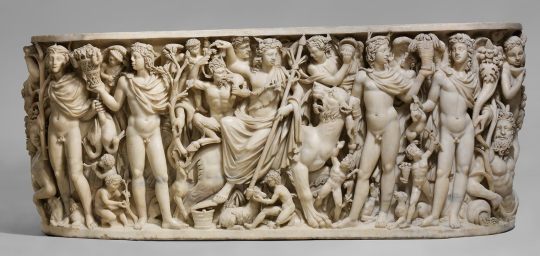
It is often said that the Romans conquered Greece with might, but the Greeks conquered Rome with their culture. Much of Roman religion, mythology, alphabet, language, culture and philosophy were heavily based on Greek ideas and sometimes even outright taken and implemented with few differences.
In terms of Philosophy, the Roman period brings us the grand life practice of Stoicism, the advancement of Platonism and Aristotelianism, the mathematically-based philosophy of the Pythagoreans, and finally the rival of Stoic thought, Epicureanism. Platonism and Aristotelianism heavily influenced the later faiths of Christianity and Early Islam, Stoicism and Epicureanism were the main two philosophies of the educated and literate class in the late Roman Republic.
Rome itself is another large topic, so I will do my best to be brief here (although I could not help myself and included some of interesting, yet irrelevant, details).

Originally, Rome was a city-state of farmers who fought for the expansion of their civilization. Most of the early history we have of Rome is filled with righteous and defensive wars. in the absence of other, non-roman, sources, we have to take these claims with a grain of salt. But regardless of how the wars were started or who was at fault for them, we know that Rome expanded rapidly through Italy, uniting the peninsula, and then continuing into Southern France, Eastern Spain, and North Africa. At their height, they controlled all lands surrounding the Mediterranean, Babylon and most of Western Europe.
The basis and ideal of Roman society was the model of the citizen-farmer-soldier, this was referred to as “Romanitas” or “Roman-ness”. A Roman was expected to actively participate in the political life of the city (citizen), have a few acres of farmland and some cattle (farmer), to sustain their family and to maintain their weapons and armor in peacetime, so they’ll be ready to defend their country whenever it is threatened as a united army of levied militia (soldier).
Politically, The Romans were in a constant tug-of-war between aristocratic and republican governance. In the beginning of the Roman Republic, the wealthy patricians and, to a degree, the middle equestrian class, were the only people allowed in most government offices. After some years of vocal plebeian dissatisfaction with this state of affairs, the Plebs got their own office in the Tribune of the Plebs, soon after laws barring Plebeians from government offices were repealed and eventually they could hold most offices and legal privileges by class were mostly nullified. For a small number of years during the late Republican period, a silver lining was found. New problems appeared though and the Republic could not avoid being replaced by an empire. This situation lend itself to 2 broad political factions: The populists and the aristocrats.
With the Roman conquests of north Africa after the Punic wars, there was a great supply of slaves coming into Roman territories. The wealthy Romans used the absence of the soldiers from their farms to buy them out and expanded them through slave labor. Since slaves require no wages, these farms operated very cheaply and with great profit compared to the small farms of the soldier-farmers who were just returning home. Most were eventually outcompeted, had to sell their farms and flood to the city for urban work. The cities were not in a much better shape, slaves there would work in manufactories of sorts, creating urban goods at little expense. In the end, Roman citizens became a squalid underclass in the fringes of Roman society, dependent on the state or rich patronage for their sustenance and selling their only property, the vote, to the wealthy each election season.
The Populist Gracchi brothers, descendants of a rich plebeian family who had gotten into the Senate, pushed for reform, specifically land reform, in favor of these dispossessed roman citizens. The Oligarchic senators, in a paranoid frenzy, murdered both of them because of their fear that they had aspirations of becoming kings. Their laws were left unimplemented or outright repealed. The state of the common citizen did not improve.
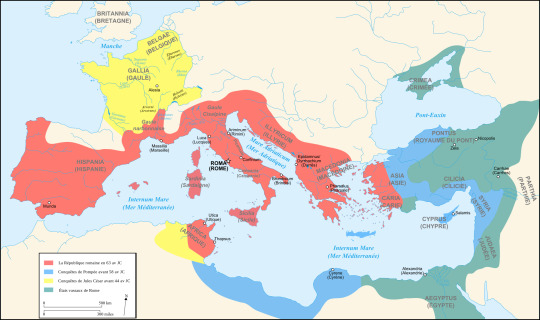
The Late Roman Empire right before Caesar’s dictatorship.
Red: The empire’s extent at 68 B.C.
Yellow: Caesar’s conquests as military commander
Blue: Pompeii’s conquests
Green: Roman client states
Afterwards, there were the Marian reforms, named after the populist Gaius Marius, which turned the Roman army into a paid professional force and then the dictatorship of his enemy Sulla. Eventually we reach the age of Julius Caesar, who established a life-long dictatorship before being murdered, his successor, Octavian (Augustus), took over and formed the Roman Empire. Caesar’s solution to the state of the average citizen was to provide them the famous “Bread and Circuses”, he created and expanded the Roman welfare state in an effort to win over the people. While this program is often disliked as a dictatorial measure to pacify the masses, I believe it is important to judge it compared to the previous state of life. Despite that, it would still be appropriate to call it a band-aid solution at best.
Throughout all of these changes, Greeks remained mostly unaffected, only being involved in the wars, civil wars and one major failed revolt, where the Greek regions were devastated for a few years. The emperor Hadrian at one point went to Greece, where he had served as Archon of Athens before the start of his rule, and tried to organize the Greek cities into an autonomous Koinon (Commonwealth/League), which was not materialized de facto in any way unfortunately.
At this point in time, Christianity appears as a faith, first mentioned around 70 A.D., it spreads to many of the Eastern Roman provinces and Greeks are some of the first ethnic groups to convert to it, creating substantial Christian communities all over the mainland, its islands, the coasts of the Levant and Asia Minor. By the 4th century, Greece is almost completely Christianized.
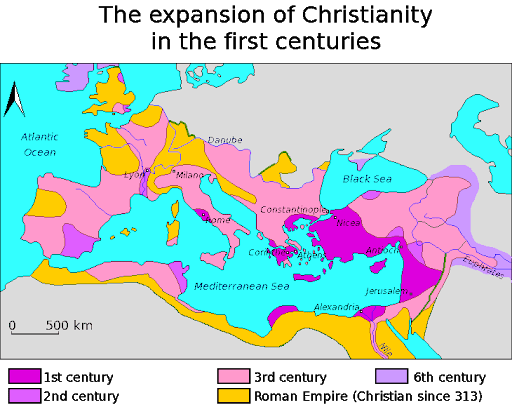
The Roman empire was eventually split into two parts by Diocletian, in order to be more efficiently governed. This cut off the more wealthy eastern provinces from the western Empire, which was in great need of funds. The Western Roman empire was barely able to last 170 years after the split, whereas the East lasted, in one form or another, until the 15th century A.D.
After the fall of the Western Roman Empire, we arrive at the Eastern Roman Empire, with its capital in Constantinople, where emperor Justinian takes the Throne in 527 A.D. He implements great legal and economic reforms, strengthens the army and sends it to many of the fallen parts of the former Western Roman empire to take them back. With his capable general Belisarius by his side, he conquers north-western Africa/former Carthage (modern-day Tunisia and north Algeria) from the Vandals, takes back Italy from the Ostrogoths and pushes the Visigoths of Spain to the interior, gaining back its south-eastern coast. These great conquests stretch the empire’s armies thin, greatly burden its economy and, combined with a devastating plague, lead to the rapid loss of all that land not even 50 years after it was attained.
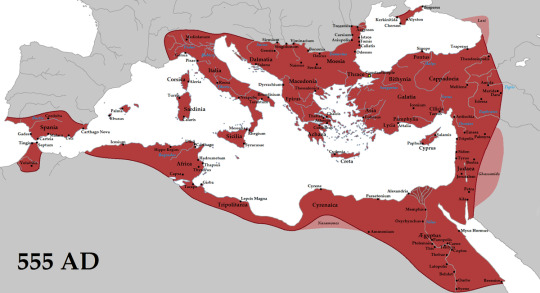
Justinian’s Empire by 555 A.D.
This is often considered the beginning of the Byzantine Empire. With the loss of these territories, the empire is once again isolated mostly to the territories of the Greek population, with the only notable exceptions, Egypt and the Levant, being lost to the emerging Arab caliphate of the Rashidun and its new faith of Islam.
The Arabs would be the main enemies of the Hellenized Eastern Roman Empire until the arrival of the Turks in the late 11th century.
The Byzantine empire is considered to have become officially Greek with the reign of Heraclius (610 - 641 A.D.), who made Greek the official language of administration in the empire, abandoning Latin.
The powerhouse of the Byzantines was Asia-Minor for the most part and it was generally concentrated in Asia-Minor and Mainland Greece, occasionally ruling over most of the Balkans and parts of Syria but rarely having the strength to venture further.
Within the Byzantine Empire we get the formation of the Christian Orthodox dogma, traditions and structure. Even before the official split with the catholic church in 1054.
The Byzantine empire was legally an elective autocracy. The Emperor was viewed as a politically-neutral defender of justice and the Christian faith, the role was likened to the referee in a sporting event, handing warnings or punishment to bad actors and prizes to fair winners. The elective element came from the legal requirement that the successor to the emperor should be chosen through a vote of the senate, something which could be (and always was) bypassed by 2 methods: The emperor had the right to appoint a co-emperor/caesar/despot (the name of the title changed over time), who functioned as a vice-president of sorts, and that individual would become the emperor after the old Emperor’s death. So emperors chose their successors by handing them the office and made elections redundant. The other route was a palace coup or open rebellion. Byzantine politics were generally very cut-throat affairs and political ministers had to always watch their backs for rivals while also avoiding the emperor’s wrath.

In 1071, Byzantine forces are defeated at Manzikert by migratory Turks, who proceed to invade Asia Minor and conquer as far as the Aegean coast, the picture above shows the areas of control around 1081.
The Byzantine emperor Alexios I seeks aid from the Pope and Western Europe in beating back the Turks and Arabs, this call for help is utilized by the pope to start the first Crusade. The first few crusades help the Byzantines reconquer much of Asia Minor again, helping the “Komnenian restoration” period of Byzantium, even if they also lead to territorial disputes with the new Crusader states of the region.
Despite that, after only a few years Byzantium keeps declining territorially and is dealt a great blow during the 4th Crusade, which gets derailed by an exiled Emperor who promises great wealth to the Crusaders if they take Constantinople for him. long story short, they take it, he cannot pay them because the treasury is empty, they loot the city and divide the empire amongst themselves.
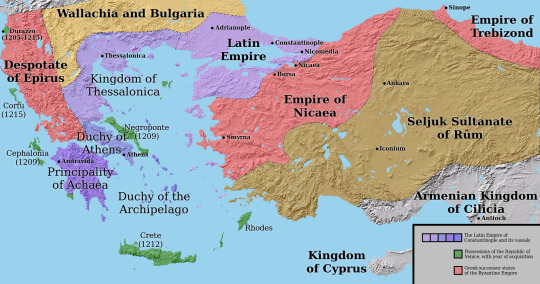
Some Greek Byzantine remnant states are created, with the most important among them being the Empire of Nicaea, the Despotate of Epirus and the Empire of Trebizond. These gradually kick the Latin states out of mainland Greece and Anatolia, until the empire is reunited by the Palaiologoi dynasty of the empire of Nicaea.
After some internal fracturing of their own, the Turks unite behind the relatively new Ottoman dynasty-state and start conquering the Greek mainland and Balkans during the 14th century, until finally taking the city of Constantinople itself in 1453. Ending Byzantium, the final remnant of the Roman empire.
7 notes
·
View notes
Text
LA NUIT DES ROIS by Philippe Lacôte
Set in the Ivory Coast heart, there is La Maca, a prison governed by the prisoners themselves. Lacôte's film focuses essentially on the theme of power as an inseparable form of relationship with the other. La Maca in this film becomes the theatre of a fight for power.

A young new prisoner, Roman interpreted by Koné Bakary: the protagonist of this story is in charge as storyteller during the last night of the blood full moon, not knowing that this will end in his own death. To stay alive, he soon understands that his story has to entertain all the other prisoners until sunrise. By doing so, Roman, through his cunning, will address the doom and change the tradition. So Roman begins the storytelling about a fellow criminal in the slum of Abidjan, Zama King, and how he was driven to his death.
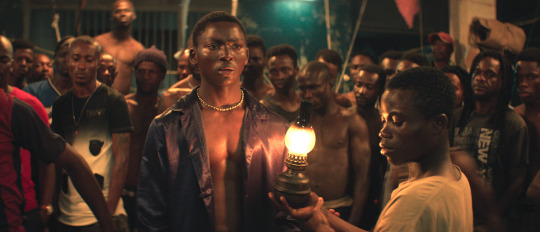
In this film, we are eye opened to the violence that dominates the daily life of Abidjan. Zhama was a genuine character, tortured, burned and killed by the population. They did not find his body. Roman's sometimes improvised story, which also bears witness to an ancient tradition of themes belonging to the culture of the griots, from whom he descended, highlights above all the drama of the country's daily life, embroidered with bloody scenarios of typical civil war clashes. Zhama, through the myth of the clash for power between an ancient queen and her younger brother, speaks of the political/social context of his country, where the dictator Gbagbo got arrested by the republican military forces, and of the games of power set inside the prison. Where another struggle for succession is taking place. He portrays the battle between the queen and her brother in a fantastic and almost virtual way: a clash that takes place through the use of special effects, without blood or victims.
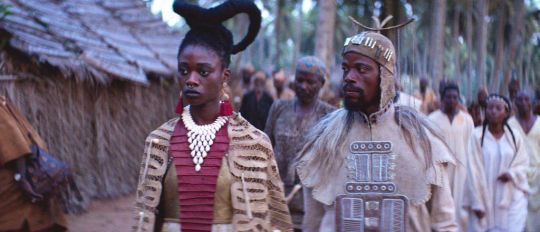
A tribute to the African culture that is steeped in and is never the basis of Shakespearean dramaturgy and Western arts. In this superb African film, we find both oral tradition, themes and dramatizations, both ancient and contemporary, amalgamated in a timeless dimension. The magnificent locations and sets also captivate the viewer, which is so authentic that the immersion in the setting is almost total.
Once again, we discover that African cinema can be profoundly theatrical. The narration of the protagonist's story, improvised on the spot, is suspenseful, intense and involving. It is reminiscent of the muddy, conflict-ridden setting of the class struggles of Quai Ouest (1985), a youthful text by Bernard Marie Koltès, where the protagonists are those of the urban subculture struggling in a battle for survival, as the case with our protagonist.
Director: Philippe Lacôte
Actors: Koné Bakary, Steve Tientcheu, Rasmané Ouédraogo, Issaka Sawadogo, Digbeu Jean Cyrille
Country: France/Ivory Coast/Canada/Senegal
Year: 2020
Length: 93 Min.
Ita —>
Nel cuore della foresta della Costa d'Avorio, c'è La Maca, una prigione governata dai prigionieri stessi. Il film di Lacôte è incentrato essenzialmente sul tema del potere come forma inscindibile di relazione con l'altro. La Maca in questo film diventa il teatro di una lotta per il potere.
Un giovane nuovo prigioniero, Roman interpretato da Koné Bakary, il protagonista di questa storia è incaricato di essere il narratore durante l'ultima notte di luna piena di sangue, senza sapere che questo finirà con la sua stessa morte. Per rimanere vivo, capisce presto che la sua storia deve intrattenere tutti gli altri prigionieri fino all'alba. Così facendo, Roman con la sua astuzia affronterà il destino e cambierà la tradizione. Così Roman inizia a raccontare la storia di un compagno criminale nella baraccopoli di Abidjan, Zama King, e di come è stato condotto alla morte.
In questo film, ci viene aperto l'occhio sulla violenza che domina la vita quotidiana di Abidjan. Zama era un personaggio reale che è stato torturato, bruciato e ucciso dalla popolazione, il suo corpo non è mai stato trovato. La storia a tratti improvvisata di Roman, che sa farsi anche testimone di una tradizione antica di temi appartenenti alla cultura dei griot, dai quali discende, evidenza soprattutto il dramma in cui vive il quotidiano del Paese, ricamato da scenari sanguinosi di scontri tipici da guerra civile. Il cantore, attraverso il mito dello scontro per il potere tra un’ antica regina e il fratello minore, parla del contesto politico/sociale del suo Paese, dove il dittatore Gbagbo è stato arrestato dalle forze militari repubblicane, nonché dei giochi di potere all’ interno della prigione dove, oltretutto si sta avverando un’altra lotta per la successione. La battaglia tra la regina e il fratello viene rappresentata in modo fantastico e quasi virtuale: uno scontro che si consuma esclusivamente attraverso l’uso di effetti speciali senza sangue e senza vittime.
Un omaggio alla cultura africana che è intrisa e che comunque è alla base della drammaturgia shakespeariana e delle arti occidentali. In questo superbo film africano troviamo riassunti sia la tradizione orale, i temi e le drammatizzazioni sia antiche che contemporanee amalgamati in una dimensione atemporale. Lo spettatore inoltre viene affascinato dalle magnifiche location e dalle scenografie che sono estremamente accurate e autentiche da far sì che l’immersione nell’ambientazione sia quasi totale.
Ancora una volta scopriamo che il cinema africano sa essere profondamnte teatrale, la narrazione del racconto del protagonista, improvvisata sul momento è carica di suspence, intensa e coinvolgente. Ricorda a tratti l’ambientazione fangosa e conflittuale delle lotte di classe di Quai Ouest (1985), testo giovanile di Bernard Marie Koltès, dove i protagonisti sono quelli della subcultura urbana che lottano in una battaglia per la sopravvivenza come accade per il nostro protagonista.
Regia: Philippe Lacôte
Attori: Koné Bakary, Steve Tientcheu, Rasmané Ouédraogo, Issaka Sawadogo, Digbeu Jean Cyrille
Pease: Francia/Costa D’Avorio/Canada/Senegal
Anno: 2020
Durata: 93 Min.
#the night of the kings#lanuitdesrois#philippe lacôte#kone bakary#film#films#cinemathography#mostradelcinema#africa#mito#mitologia#narrazione#lamaca#ivorycoast#prison#prisoners#venezia77#biennalecinema#biennale cinema
2 notes
·
View notes
Note
Hi! How are you? Would you give me book recs? I am trying to expand my reading habits. Anything can go, politics, esoterism, novels, poetry, just authors or books you like. Hope you have a nice day!
oh man okay let me see what i can come up with
poetry:
leaves of grass, walt whitman
duino elegies, rainer maria rilke
twenty love poems and a song of despair, pablo neruda
les fleurs du mal, baudelaire
the cantos, ezra pound
the songs of innocence and experience, william blake
collected poems, t.s. eliot
politics:
politics, aristotle
the republic, plato
the prince, machiavelli
discourses on livy, machiavelli
federalist papers, alexander hamilton
spirit of the laws, montesquieu
philosophy of right, hegel
reflections on violence, sorel
the crisis of parliamentary democracy, schmitt
on dictatorship, schmitt
political theology, schmitt
on the republic, cicero
on the laws, cicero
rights of man, paine
the soul of man under socialism, wilde
siege, mason
manifesto of futurism, marinetti
republic of the lacedaemonians, xenophon
doctrine of fascism, gentile
the coming american fascism, dennis
history:
the horse, the wheel, and language, anthony
the uniqueness of western civilization, duchesne
mitra-varuna: an essay on two indo-european representations of sovereigntym, dumezil
myth, cosmos, and society: indo-european themes of creation and destruction, lincoln
anabasis, xenophon
the histories, herodotus
history of the peloponnesian war, thucydides
the histories, polybius (book vi could belong in the politics category)
bellum gallicum, caesar
sulla, the last republican, keaveney
philosophy/spirituality/religion/occult:
thus spoke zarathustra, nietzsche (really anything and everything by nietzsche)
fragments, heraclitus
complete works of plato
on duties, cicero
nicomachean ethics, aristotle
the iliad, homer
on the gods and the world, sallust
aeneid, virgil
metamorphoses, apuleius
on being and time, heidegger
the phenomenology of spirit, hegel
process and reality, whitehead
the vedas (especially the rigveda)
monadology, leibniz
the orphic hymns
essays, emerson
bhagavad gita
chaldean oracles
three books of occult philosophy, agrippa
on heroes, hero-worship, and the heroic in history, carlyle
the enneads, plotinus
man and his becoming, guenon
symbolism of the cross, guenon
elements of theology, proclus
theurgy, iamblichus
secret teachings of all ages, hall
seven sermons to the dead, jung
psychology and alchemy, jung
pagan imperialism, evola
introduction to magic, evola
the hermetic tradition, evola
morals and dogma, pike
crisis of the modern world, guenon
other stuff:
old man and the sea, hemingway
the little prince, de saint-exupéry
the hobbit, tolkien
underground man, dostoevsky
moby dick, melville
treasure island, stevenson
blood meridian, mccarthy
sun and steel, mishima
dune, herbert
rendezvous with rama, clarke
neuromancer, gibson
#this is far from an exhaustive list#and while i tried to mostly include books that i have personally read#either partly or in full#there are a few i haven't read yet that i've included#because i intend to read them#but yeah#i will add more as i remember#but this is a good start i think#Anonymous
15 notes
·
View notes
Text
in which caesar doesn’t do anything much and all the women are named julia
[Hi, this is me stanning Adrian Goldsworthy’s biography of Caesar. I studied Classics, but not this period, so all I can contribute here are squeals of delight, a few mistakes and the occasional witty comment. If you’d like to know more, please buy the book - it’s really good and a fun read.]
PART 2
The thing is - there’s a lot of boring relevant political stuff going on in this chapter, but I’m mostly fascinated by the glimpses we get into the world of Roman women.
As I said, this is not really my area, so I know random, unconnected facts about how life was like for them; also it doesn’t make much sense to talk about ‘Roman women’, because, as a reminder, ‘Rome’ stretches from the 14th century BC to the 14th century AD, came to include dozens of very different regions, and obviously was home to an incredibly diverse population. And if we’re talking about the late Republican / imperial aristocracy, there’s a sharp divide anyway: on the one hand, the ‘ideal woman’ is the same old model we’re all used to and heard about (silent, obedient, virtuous, chaste, a perfect mother and so on), but on the other, Roman noblewomen had a lot more freedom than, say, their Greek counterparts, so there was usually some political scheming going on - something that in Greece was reserved to a handful of very well-placed courtesans.
(In this sense, think about the contrast between Lucretia, the mythological wife of Collatinus, whose fridging created the Republic, and Agrippina, mother of Nero, empress and all-round badass bitch.)
Anyway, this chapter made me think about women because it starts with Caesar being born and getting his name - it’s sort of an urban legend, btw, that every single Roman had three names: that was just for the Moste Noblest - and how Goldsworthy casually mentions that, unlike men, women of noble birth would just take their family surname as first name. In Caesar’s family, for instance, all the women were named Julia.
(As a reminder: his given name was Caius, then ‘Julius’ identified the tribe, and finally ‘Caesar’ was a nickname that was possibly given to his grandfather for something elephant-related.

People whose grandfathers did not do elephant-related stuff generally never enjoyed the prestige of a funny nickname passed down through the generations.)
So it’s bad enough that twins might be named ‘Peter and Not-Peter’ or ‘Peter and Twin’, but imagine going to the park with your buggy and meeting your old friend Oldest She-Jones (daughter of Ferdinand Jones), now married to George David Taylor, and her five kids - Louis David Taylor, She-Taylor, She-Taylor the Second, She-Taylor the Third and She-Taylor Born on Christmas. So damn cute, and also the reason why the Romans never developed smartphones or social media - how the hell are you supposed to find someone on Vultocodex when every single cousin and aunt has the exact same name?
Poor management, that is.
But anyway - as I said, there’s a dissonance here because women being treated like garbage (like, not given normal names and married off at fourteen) also led to the very peculiar phenomenon: generations of (male) politicians and VIPs being raised by very forceful, strong, and ambitious (widowed) mothers. Because if you count old age, wars, trampolining injuries (let’s be honest, men have always been obsessed with attempting dangerous stunts just for the fun of it) and the general risks of Roman politics, it was very usual for a noble kid to not even remember his father at all.
(Nero is a good example of how weird and all-consuming this boy-mother relationship could become - there’s entire books about it, but I’d point 16-and-over readers to Suetonius’ Life of Nero for details.
Keep in mind 95% of it is propaganda because Suetonius hated Nero, but still. HBO-worthy stuff in there.)
All this to say - we know that Caesar had a very close relationship with his mom (named ‘Aurelia’ because - you guessed it - she came from the Aurelii family), who was a near perfect figure of virtue, intelligence, beauty and common sense. Very powerful in her own right, Aurelia raised Caesar basically on her own, because her (much older) husband was either away at war or dead for most of their marriage.
Aside from drinking in Aurelia’s wisdom, Caesar’s education also included the normal lessons noble Roman boys were required to learn: self-worth, narcissism, delusional manias, rhetoric, martial arts, horse-riding, and writing really bad fanfiction based on Greek myths.
And now for the MEANWHILE part.

(I have no idea why this gif was tagged ‘meanwhile’, but I’m not enough of an idiot to let it go to waste, so.)
Meanwhile, all sort of messes were going on.
As I’m sure you remember, at some point the consul was Marius - Caesar’s uncle and a military genius, but not much of a politician. His negotiation tactic of choice was secretly inviting groups of unconnected people to his house on the same night, serving them dinner in two separate rooms so they wouldn’t see one another and try to work out some kind of agreement between them. Whenever a new point came up, Marius would say he had diarrhoea, pretend to run to the bathroom and instead sit down with the second group and see what they thought about the first group’s proposal.
(Isn’t ancient Rome magnificent?)
A big problem Marius had to deal with was how to grant citizenship to the allied tribes in Italy without pissing off current citizens. Basically no one wanted these other guys to be given new rights, but since they supplied more than half the soldiers of the Roman army and got nothing in return, their patience was running a bit thin. At some point, Roman bureaucrats started to erase foreign-born citizens from their lists claiming they were not actual citizens (something so openly dishonest NO OTHER GOVERNMENT would EVER attempt it again), and next yet another tribune working on a citizenship reform was stabbed to death in the street.
So the allies went to war.
(This war, confusingly, is known as the Social War, because ‘socius’ means ‘ally’ in Latin.)
As you can imagine, it was a disaster. Most of the allied communities had been part of the Roman republic for I don’t want to check but let’s say decades, they lived side by side with Roman families and fought in the same wars, so it was more of a civil war than anything else. Some tribes chose to remain faithful to Rome, others didn’t. Lots of people died.
Caesar was too young to be a soldier, but this was Cicero’s first taste of war (bet you never thought of that weaselly weasel as a soldier, uh? appearances can be deceiving, folks!). Marius was also involved, but since he was old as shit and had famously weak and leaky guts (hahahhaha), he mostly stayed out of active combat, which wasn’t all that normal for a Roman general. In the end, the whole of Italy, down to defeated tribes, cows, dogs and random patches of mossy rocks, was granted citizenship and everyone went home. Their votes, however, were inserted in the system in such a way that they didn’t count much.
On the whole, the one winner of this war was Lucius Cornelius Sulla, one of the military commanders, who became a consul soon after.

Another war, because this is Rome and Romans were dicks, but! this one was in the East, which means every single soldier would get super rich and also! wars in the East were considered easy because *insert racist trope here* and! Sulla had been promised that, as the big winner of the Social War, he could go there with his legions and basically enjoy this Disneyland of golden cups and ultraviolence but! at the last moment, Marius, who never liked Sulla much, managed to snatch the commandership from him, which! was completely legal but also *insert outraged emoji* and wait for it! instead of going gentle into the good night, Sulla made a fiery speech to his soldiers all like GUESS WHAT FOLKS WE’RE STUCK HERE SCRATCHING OUR TESTICULI AND THOSE IDIOTS FROM THE 25TH ARE TAKING YOUR GOLD AND YOUR UNWILLING WOMEN and! Sulla’s entire army marched! on! the! city! of! Rome!

It was the first time a Roman army had ever invaded Rome. Nobody was expecting it, and people panicked. Sulla’s men won easily, burned down some buildings, killed some people, generally had a great time; and then Sulla announced a bounty for anyone who’d disembowel his political enemies (including Marius) because he didn’t have time to go to Braavos and learn how to do it himself (remember, he still had his war waiting for him in the East).
(This turned out to be a success, btw. One guy was even killed by his slave - Sulla gave him the promised reward, then shoved him off a mountain because duh, slave and “When I said ‘anyone’, I meant people, not IKEA furniture” and “Honestly”.)
As nobody could have imagined and/or predicted, as soon as Sulla left for Greece Weak Guts Marius came back with an army and took back the city, beheading his way to the Senate and leaving a trail of blood wherever he passed. As soon as he got there, however, he dropped dead - heart attack, trampolining, diarrhoea, who can tell - and the city was taken over by his second-in-command, Lucius Cornelius Cinna.
(Man, what a ride.)
Unfortunately, it’s impossible to know what Caesar was doing during this time.
Personally, I like to imagine him in Rome - a well-dressed, grey-eyed 15-year-old, freshly orphaned, horrified and exhilarated by the violence exploding all around him - I see him running down the streets, stopping to watch the corpses float in the dark waters of the Tiber, daring his friends to go and touch the severed heads nailed to the doors of the Senate; recognizing many of those heads as friends and colleagues of his father and uncle (passing a hesitant finger on the cold flesh, remembering how they’d once laughed and frowned and spoken about boring matters from the dais).
The truth is, Caesar was just a kid. He was supposed to learn about the Republic, and his own role in making it great, by watching his elders.
God knows what he actually learned, and what he thought, as he was passing through Rome’s paved streets, now shimmering with blood.
PREVIOUS — NEXT
#julius caesar#ancient rome#history#classics#antiquity#adrian goldsworthy#book rec#history crack#sort of#elephant boy#problematic fave
31 notes
·
View notes
Text
The importance of perspective (Roman Republic #6)
We’ve covered almost 100 years so far, and I think that’s important to recognize. These things don’t happen overnight. Or maybe they happen slowly and everyone realizes that they’ve happened all at once. There was likely no one alive as Julius Caesar took power who could remember the beginning of this story. Everyone alive — and remember, life expectancy was much shorter -- had only seen the last few decades of the story.
So when Julius Caesar was killed, most Romans likely did not have a direct memory of the conservative reforms of Sulla, for example, and the period of Marius’ supremacy was likely just a story passed down from generation to generation. Another thing to think about is how people knew about all of this. Even though I was not alive during Watergate, I have seen hours of footage from it. I know what Richard Nixon looked like, how (un)trustworthy he sounded, and have seen and heard some of the evidence in the case. Romans didn’t have any of this. So for the people alive during the absolute end of the republic, which is what we will discuss today, very few of them had any memory of the republic really working the way it should. The changes we have been discussing would have not seemed like changes — they were just the way things were.
There’s something that ecologists talk about called baseline syndrome, which is that people assume that the natural state of the world is whatever things were like when they were children. We can’t really imagine what the natural world was like 200 years before we were born. I think this is instructive. What was the version of baseline syndrome that applied to Roman politics? What is our own version of baseline syndrome as it applies to our own lives and systems?
After his year as consul, Caesar took the next step on the path to being a great Roman politician — conquest. He got the assignment to conquer Gaul, modern-day France, and spent the next ten years ruthlessly subjugating the people there. In the meantime, Crassus decided that he was falling behind his peers and launched an expedition to conquer Persia. It was an abject failure, as Crassus’ plodding Roman army was outmaneuvered by the Persian cavalry and slaughtered. Crassus’ skull was used as a drinking cup by the Persian emperor.
After Gaul had been conquered, in the year 49, Caesar wanted to run for consul again. In order to do so, he would have to come back into the city of Rome, leaving his army behind because Sulla’s rules — made after Sulla himself had marched on Rome — had made it illegal to march an army into Rome.

Julius Caesar (https://en.wikipedia.org/wiki/Julius_Caesar#/media/File:Retrato_de_Julio_C%C3%A9sar_(26724093101).jpg)
Caesar had a choice — pass up the political opportunity or go to the viper’s pit of Rome unprotected, where he could be murdered without his soldiers. He chose neither, marching on Rome and beginning another civil war. Pompey and his allies fled, and Caesar entered Rome with a somewhat surprising promise to bestow forgiveness on his enemies. Then he chased down Pompey, defeated him in Greece, and then chased him to Egypt. The Egyptians, seeing the writing on the wall, murdered Pompey before Caesar arrived there, making it impossible for Caesar to bestow his forgiveness on his greatest enemy. After securing Egypt for the empire (and fathering a child with Cleopatra, the Egyptian queen he had helped to ascend to the throne), Caesar headed back to Rome. He was declared dictator for ten years and seemed unassailable. The Republican form of government that Rome had had for 450 years looked dead, for sure.
Julius Caesar took power in Rome, attempting to appear magnanimous in victory by sparing most of his enemies. And by most accounts he was quite popular, especially with the ordinary people of Rome. He governed as another of the populists, giving out lots of free food and creating jobs. But, as he was made dictator for ten years — and then for life — and began to hog all of the power in the Roman government, the political class became alienated. Many Roman politicians began to realize that they would never get a shot at real power (and the wealth and fame that came with it) if Caesar was hogging the limelight. And some of them also began to worry that the Republic itself was falling away; that Caesar would rule as a king. And so a group of senators, led by the famous Brutus and Cassius — Brutus was a close friend of Caesar — decided that he had to die.

Nineteenth century drawing of actors playing Brutus and Cassius in a production of Shakespeare’s Julius Caesar (https://shakespearestaging.berkeley.edu/images/julius-caesar-edward-loomis-davenport-1815-1877-as-brutus-william-charles-macready-1793-1873)
They killed him in broad daylight on the Senate floor, making sure that as many people as possible stabbed him. They wanted to own the act, because they saw themselves as the liberators of Rome. Were they? Or were they just reclaiming some of the power for themselves, going back to another unfair system that might have benefitted them a little more personally? What would it even mean to “restore the Republic?"
{WHF} {HTE}
6 notes
·
View notes
Text
Arthur Keaveney, Sulla – The Last Republican

View On WordPress
0 notes
Photo

A Very Short Fact: On this day in 49 BC, Julius Caesar crossed the Rubicon signalling the start of the Great Roman Civil War. This would be one of the last politically driven military conflict before the founding of the Roman Empire. Caesar was considered a hero by man of Rome’s citizens, and his declaration of war was met with approval.
“The clash of the two warlords, which marked the beginning of the end for the Republic, was a very Roman civil war. It was not a war fought over patriotism or rival visions for Rome’s future. It was a struggle for power, gloria, and dignitas, the selfish principles of the Roman elite, and marked the culmination of the self-destructive Roman competitive ethos. As Caesar’s ten-year campaign in Gaul drew to a close, his enemies gathered to condemn him. Pompeius, fully aware of the threat that Caesar posed to his pre-eminence, allied with Cato and the conservatives to champion the ‘Republican’ cause. Like Sulla a generation before, when faced with the choice between war and political oblivion, Caesar chose war. Appealing to his soldiers to defend his dignitas, on 11 January 49 BC Caesar crossed the Rubicon River into Roman Italy with the immortal words alea iacta est (‘the die is cast’). Looking back a century later under the emperor Nero, the Roman poet Lucan simply declared ‘Caesar would accept no superior, Pompeius would accept no equal.’
[P. 111-112 The Roman Republic: A Very Short Introduction by David M. Gwynn]
Like the Very Short Introductions on Facebook for more from the series.
Image credit: History of Julius Caesar (1849) by Internet Book Archive Images. Public domain via Wikimedia Commons.
#Julius Caesar#rubicon#rubicon crossing#history#on this day#OTD#on this date#very short fact#ancient history#great roman civil war#Ancient Rome#the roman republic#vsi#rubicon river#Roman Empire#sulla
54 notes
·
View notes